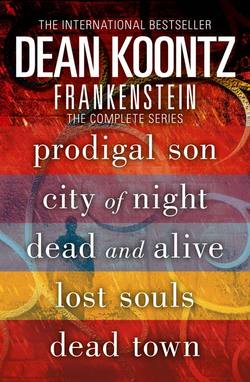Читать книгу Frankenstein: The Complete 5-Book Collection - Dean Koontz - Страница 90
CHAPTER 80
ОглавлениеRANDAL SIX STANDS motionless at the threshold of the next room for so long, so tensely, that his legs begin to ache.
The New Race does not easily fatigue. This is Randal Six’s first experience with muscle cramps. They burn so intensely that at last he takes advantage of his ability to block pain at will.
He has no watch. He has never before needed one. He estimates that he has stood, riveted by his predicament, in this same spot for perhaps three hours.
Predicament is a woefully inadequate word. The correct one has fewer letters and stronger meaning: plight.
Although he has spared himself physical agony, he cannot escape mental anguish. He despises himself for his inadequacies.
At least he has stopped weeping. Long ago.
Gradually his impatience with himself darkens into an intense anger at Arnie O’Connor. If not for Arnie, Randal Six would not be in this plight.
If ever he reaches the O’Connor boy, he will get the secret of happiness from him. Then he will make Arnie pay dearly for all this suffering.
Randal is also plagued by anxiety. Periodically his two hearts race, pounding with such terror that sweat pours from him and his vision becomes blood-dimmed.
He fears that Father will discover him missing and will set out in search of him. Or perhaps Father will finish his current work and leave for the night, whereupon he will find Randal standing here in autistic indecision.
He will be led back to the spinning rack and secured upon it in a cruciform. The rubber wedge, secured by chinstrap, will be inserted between his teeth.
Although he has never seen Father in a rage, he has heard others speak of the maker’s wrath. There is no hiding from him and no mercy for the object of his fury.
When Randal thinks that he hears the sound of a door opening at the farther end of the hall, behind him, he closes his eyes and waits with dread.
Time passes.
Father does not appear.
Randal must have mistaken the sound or imagined it.
As he stands with his eyes still closed, however, and as his hearts seek a normal rhythm, a calming pattern arises in his mind’s eye: arrangements of empty white boxes against a black background, intersecting in the beautiful virgin lines of an unworked crossword puzzle.
While he concentrates on this barren image for its soothing effect, a solution to his plight occurs to him. When there are not squares of vinyl tile or concrete or other material on the floor in front of him, he can draw them with his imagination.
Excited, he opens his eyes, studies the floor of the room beyond the threshold, and tries to paint upon it the five boxes that he must have to finish spelling chamber when he crosses threshold.
He fails. Though with eyes closed he had been able to see those boxes clearly in his mind, the concrete floor before him remains resistant to the imposition of imagined geometries.
Tears almost overtake him again before he realizes that he does not need to have his eyes open to traverse this room. Blind men walk with the help of canes and patient dogs. His imagination will be his white cane.
Eyes shut, he sees five boxes. He steps straight forward five times, spelling as he goes: a-m-b-e-r.
When the word is complete, he opens his eyes and finds that he stands at the outer door. The electric door behind him has fallen shut. The portal before him has a simple latch that is always engaged from the farther side, always disengaged from this side.
He opens the door.
Triumph.
Beyond lies a parking garage, dimly lighted and deserted at this hour. Silent, still, smelling faintly of dampness and lime.
To exit this small room, Randal Six merely closes his eyes and imagines threshold printed in blocks from left to right, immediately in front of him. Conveniently, the word garage intersects at the letter r.
With his eyes closed, he determinedly takes three steps, a-g-e, into the enormous space beyond. The door falls shut behind him, now locked from this side.
There is no going back.
The daunting dimensions of the parking garage awe and for a moment nearly overwhelm him. No room of his experience in Mercy has prepared him for this immensity.
An inner quaking seems to knock bones against bones. He feels like a highly compressed pellet of matter at the instant before the universe’s creation, and with the impending Big Bang, he will expand and explode outward in every direction, racing to fill an infinite void.
With more powerful reason than he has heretofore been able to apply to his condition, he convinces himself that the void will not pull him apart, will not scatter him to eternity. Gradually his panic subsides, fades entirely.
He closes his eyes to imagine blocks, and doggedly he spells his way forward. Between each word, Randal opens his eyes to scope the route ahead and to determine the length of the next word that he will need.
In this fashion, he eventually comes to an exit ramp and climbs to the street. The Louisiana night is warm, moist, droning with mosquitoes.
By the time he travels the better part of a block and turns right into an alleyway, the brush of dawn paints a faint gray light in the east.
Panic threatens him once more. In daylight, with everyone awake and on the move, the world will be a riot of sights, sounds. He is certain that he cannot tolerate so much sensory input.
Night is a better environment. Darkness is his friend.
He must find a place to hide until the day passes.
